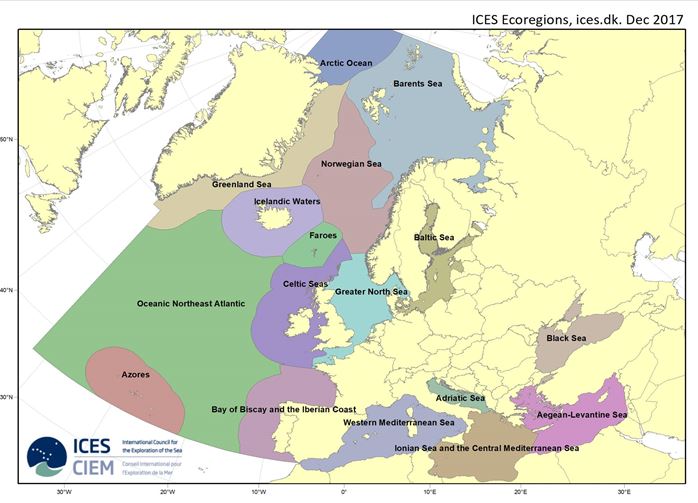
- International Council for the Exploration of the Sea was established at Copenhagen in 1902 as a result of conferences held in Stockholm in 1899 and in Christiania in 1901.
- The Convention for the International Council for the Exploration of the Sea came into force on 22 July 1968.
- The Headquarters of ICES is in Copenhagen, the Kingdom of Denmark.
- The ICES network has nearly 6000 scientists from over 700 marine institutes in 20 ICES member countries and beyond. Over 2500 scientists participate in ICES activities annually.
- The ICES member countries are: Belgium, Canada, Denmark, Estonia, Finland, France, Germany, Iceland, Ireland, Latvia, Lithuania, the Netherlands, Norway, Poland, Portugal, Russian Federation, Spain, Sweden, United Kingdom and United States of America.
- ICES has the following structure: Council, Advisory Committee (ACOM), Science Committee (SCICOM), Data and Information Group (DIG), and the Secretariat. The Council is a decision-making body represented by President and two delegates from each member country. ICES is an international science body, which provides annually advice on exploitation of aquatic biological resources to ensure their sustainable use and conservation and to protect vulnerable marine ecosystems (VMEs), as well as on other issues within ICES competence.
- ICES advice is provided to a wide range of recipients, including ICES member countries and international organisations and commissions such as the North East Atlantic Fisheries Commission (NEAFC), the North Atlantic Salmon Conservation Organization (NASCO), the North Atlantic Marine Mammal Commission (NAMMCO), Commission of the Convention for the Protection of the Marine Environment of the North-East Atlantic (OSPAR), the Baltic Marine Environment Protection Commission (HELCOM), European Commission, etc.
The Polar Branch participates on an annual basis in the Advisory Committee (ACOM) and the following ICES Working Groups:
- Arctic Fisheries Working Group (AFWG)
- Working Group on Widely Distributed Stocks (WGWIDE)
- Working Group on the Integrated Assessments of the Barents Sea (WGIBAR)
- Working Group of International Pelagic Surveys (WGIPS)
- Working Group on Oceanic Hydrography (WGOH)
- Working Group on North Atlantic Salmon (WGNAS)
- Working Group on the Biology and Assessment of Deep-sea Fisheries Resources (WGDEEP)
- Northwestern Working Group (NWWG)
- ICES/NAFO Working Group on Deep-water Ecology (WGDEС)
- Working Group for the Celtic Seas Ecoregion (WGCSE)
- Joint NAFO/ICES Pandalus Assessment Working Group (NIPAG)
- ICES/NAFO/NAMMCO Working Group on Harp and Hooded Seals (WGHARP)
More information can be found at: http://www.ices.dk.
